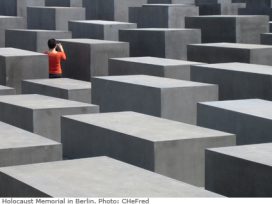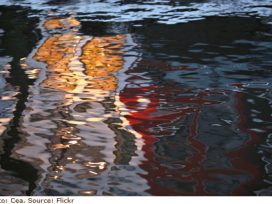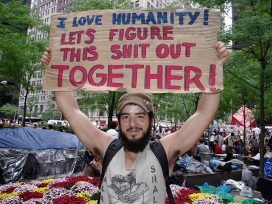Former communist countries, whether in the EU or on its threshold, should remind themselves more often of what life was like for them only twenty years ago. For Croatia, peace and security should be more important than expected economic gains from EU membership, writes Slavenka Drakulic.
Articles
Read more than 6000 articles in 35 languages from over 90 cultural journals and associates.

Peter Pomerantsev enters the matrix of managed democracy that underpins postmodern dictatorship in Russia. A society of pure spectacle, with fake parties, fake opposition, fake scandals and fake action: this is the political technologists’ project, in which (almost) everything becomes PR.
Participatory democracy or bust!
Message from the "heartbeat" city
Ayse Kadioglu reads the protests in Istanbul as a sign that people demand more than representative democracy. Indeed, it is the citizens’ search for participatory democracy that, for the first time in years, may mean Turkey really does become a model in its region.

Commemorative causality, the confusion between present resonance and past power, denies history its proper subject, writes Timothy Snyder. What is easiest to represent becomes what it is easiest to argue and, in lieu of serious explanations, only emotional reflexes remain.
Kerem Öktem explains why the occupation of Gezi Park in Istanbul’s Taksim Square quickly turned into an enormous eruption of protest; the key factors being increasingly uninhibited neoliberal development, the government’s conservative zeal and a troubled foreign policy.
Süreyyya Evren looks at how an understanding of form gained through the prism of “unrest” is transposed back into contemporary art and finds that one of the most quintessential features of political art is a never-ending process of searching.
The rise of the tycoons
Economic crisis and changing media ownership in central Europe
As the regional presence of international players diminishes two decades after the privatization of media markets, local business elites looking to win influence are buying into the media sector. Vaclav Stetka takes stock of the consequences for free and independent journalism.
Understanding multiculturalism
Has multiculturalism in Britain retreated?
Varun Uberoi and Tariq Modood argue that multiculturalism may mean the emergence of a culturally diverse citizenry, a policy or a vision for the nation. That it has received anything but a good press of late prompts Uberoi and Modood to clarify why multiculturalism is in fact flourishing in Britain.
Deeper than a tweet
The Boston bombing and why you can't become completely American
George Blecher pinpoints exactly what it is that confuses Americans about the actions of Dzhokhar Tsarnaev, who, prior to the bombing of the Boston Marathon, may not have been far off from becoming an ideal American. But then becoming completely American always was a fiction.
What if the attempt earlier this year on the life of a Danish Islam critic proves to be yet another instance of a concentrated assault on free expression by fundamentalist believers? Frederik Stjernfelt slams the critics of Enlightenment values for their complacency.
On Wednesday 22 May 2013, British soldier Drummer Lee Rigby was killed in broad daylight in the street near a military barracks in Woolwich, south-east London. Professor of peace studies Paul Rogers insists that there is a connection between this shocking murder and “remote-control” attacks by western states. Recognizing this connection is crucial if we are to avoid such extreme violence in the future.
The role of the sceptic
A conversation with John Gray
The destination of intellectual journeys, remarks John Gray, is unknown at any one time. Utopianism, on the other hand, usually ends in disaster. Thus the radical anti-communist of the 1970s finds Marx’s analysis of capitalism prescient today and rates Keynes above Hayek.

On 28 September 2012, the Institut français d’Estonie opened a series of debates entitled “New ideas in Europe”. In the first event, Marc-Olivier Padis of Esprit and Märt Väljataga of Vikerkaar exchanged ideas on “Cultural journals and new ideas”. The following is a reworked version of Marc-Olivier Padis’ contribution to the debate.


Who will outsmart who, and who will be kicked out first? This is the job market, and probably society at large, reduced to the level of a TV reality show, writes Bauman. However, though the spirit of solidarity is in exile, it would be premature to give up on the prospect of its return just yet.
The presidents and prime ministers of Balkan countries have convinced Europe that they represent the only guarantee that the Balkans will not descend back into war. It is through this kind of counterfeit politics that Croatia has arrived at the threshold of the European Union.